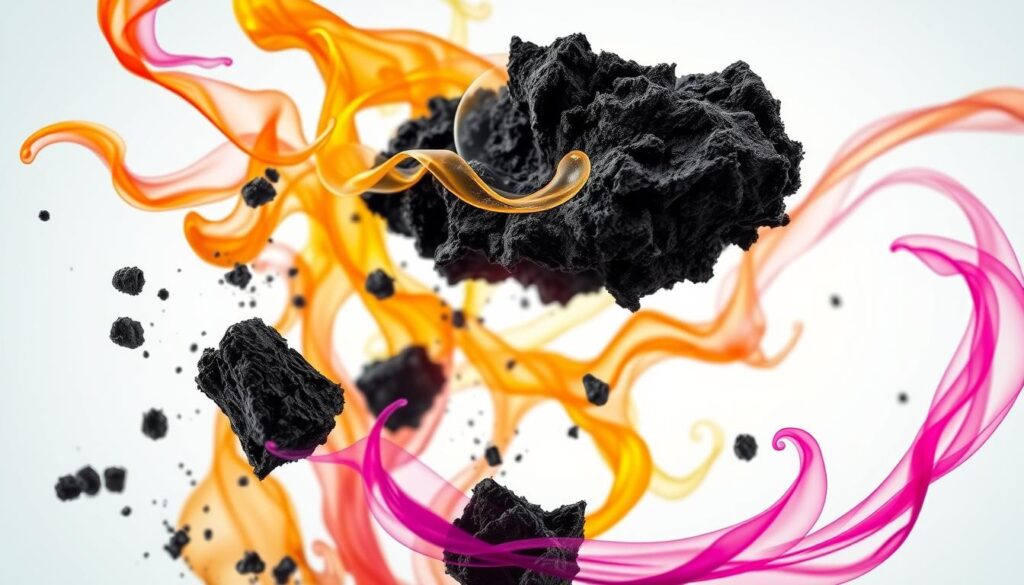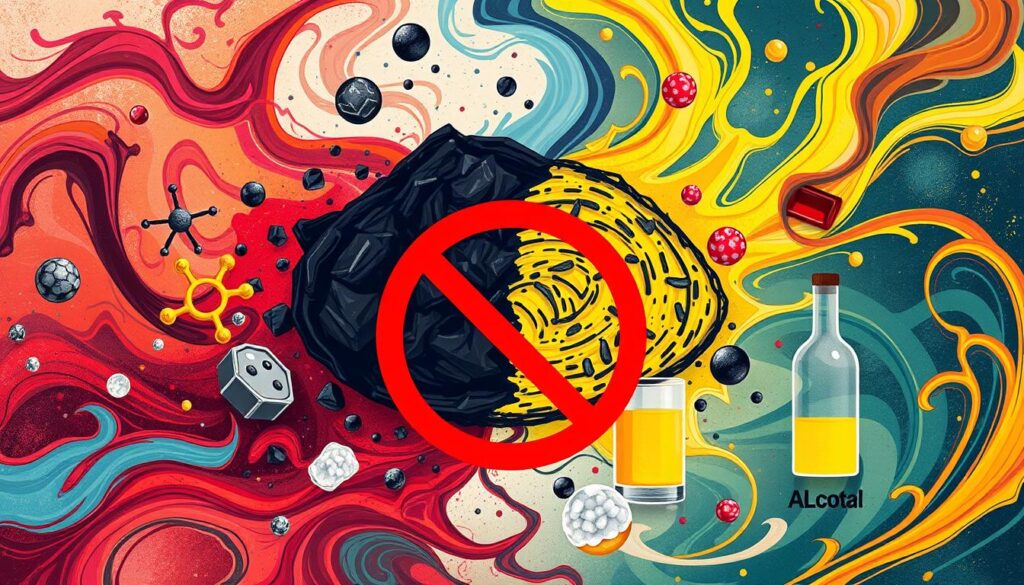Could activated charcoal be the key to flushing out harmful toxins from your body? This unassuming black powder has emerged as a powerful weapon in the fight against poisonings, overdoses, and even accidental exposure to environmental toxins. But what makes activated charcoal so effective at trapping and removing a wide range of toxins? Dive into the science behind this natural detoxifier and discover the remarkable ways it can safeguard your health.
Key Takeaways
- Activated charcoal can significantly reduce the absorption of many ingested toxins, particularly when administered within the first hour of exposure.
- It is an essential medication for treating poisonings and drug overdoses, as it can limit the entry of toxins into the bloodstream.
- Activated charcoal works by creating an equilibrium where toxins in the gut bind to its large surface area, preventing their systemic absorption.
- It is effective in adsorbing a wide range of substances, including medications, phytotoxins, and various organic and inorganic materials.
- Proper dosing and administration guidelines must be followed to ensure the safe and effective use of activated charcoal in emergency situations.
Introduction to Activated Charcoal as a Detoxifier
Activated charcoal is a type of carbon that’s been used for centuries. It’s known for removing toxins and cleaning the gut. This substance traps toxins in the gut, stopping them from spreading through the body.
Mechanism of Action and Efficacy
Activated charcoal works because it has a huge surface area. When you eat it, it grabs onto toxins and unwanted stuff. This happens in the gut, where it stops these substances from getting into your blood.
Research shows activated charcoal can cut down toxin absorption if taken quickly. But, it’s not clear if it really helps patients more. The way it works is by balancing the toxin and charcoal mix, making sure there’s enough charcoal.

“Activated charcoal has been used in workplaces to protect against harmful organic vapors like paints, adhesives, and plastics.”
Studies prove activated charcoal is good for cleaning the gut and stopping toxins from coming back. But, how well it works depends on the toxin and when you take it.
Indications for Using Activated Charcoal
Activated charcoal is a useful treatment for many poisoning cases. It works best when given within 1 hour of poisoning. This is because it can pull out harmful substances from the stomach.
It’s also good up to 4 hours after poisoning, especially for big ingestions. This includes ingestions of delayed-release drugs and substances that slow down the stomach.
It’s best for people who can follow instructions and don’t need help breathing. It’s great for poisoning without a specific antidote. For serious poisonings, like those from certain drugs, more doses of activated charcoal might be needed.
Studies have shown activated charcoal works well in different situations. It can help with constipation, according to a trial. Another study found it effective in treating poisoning cases.
It also helps in paracetamol overdose cases, depending on the dose. This shows its value in treating poisoning.
| Scenario | Research Findings |
|---|---|
| Constipation | A randomized controlled trial showed activated charcoal to be efficacious in relieving constipation in the study participants. |
| Acute self-poisoning | One study indicated that multiple-dose activated charcoal was effective in acute self-poisoning cases, supporting its use for gastrointestinal decontamination. |
| Paracetamol overdose | Activated charcoal was found to have a dose-dependent adsorptive capacity for gastrointestinal decontamination in the event of a paracetamol overdose. |
Activated charcoal is used in many ways in emergency care. It helps with poisoning and other medical issues. Its wide use and effectiveness make it a key tool in activated charcoal indications, poisoning treatment, toxin ingestion, and emergency care.
Toxins and Substances Effectively Adsorbed by Activated Charcoal
Activated charcoal is a powerful tool for removing toxins and chemicals from the body. It can trap a wide range of harmful substances, including drugs, chemicals, and toxins from plants. This makes it a key player in treating poisoning and overdose cases.
Medical Drugs and Chemicals
Activated charcoal is great at adsorbing drugs and chemicals that can cause poisoning. It can bind to substances like acetaminophen, aspirin, and barbiturates. This helps prevent them from being absorbed by the body and aids in their removal.
Phytotoxins and Natural Poisons
It also works well against plant toxins and natural poisons. For example, it can adsorb toxins from mushrooms, aconite, and foxglove. This makes it a vital tool in managing exposure to these harmful substances.
But, it’s important to know that activated charcoal doesn’t work for everything. It can’t adsorb alcohols, metals, electrolytes, acids, and bases because of their unique properties.
| Toxin or Substance | Adsorption by Activated Charcoal |
|---|---|
| Acetaminophen | Effective |
| Aspirin | Effective |
| Barbiturates | Effective |
| Tricyclic Antidepressants | Effective |
| Theophylline | Effective |
| Phenytoin | Effective |
| Amatoxins (Death Cap Mushrooms) | Effective |
| Aconitine (Aconite) | Effective |
| Colchicine (Autumn Crocus) | Effective |
| Cardiac Glycosides (Foxglove) | Effective |
| Alcohols | Not Effective |
| Metals | Not Effective |
| Electrolytes | Not Effective |
| Acids | Not Effective |
| Bases | Not Effective |
Activated charcoal is a crucial tool in treating drug overdose, chemical poisoning, and exposure to plant toxins and natural poisons. Its ability to adsorb and remove harmful substances makes it essential in emergency and medical care.

What toxins are absorbed by activated charcoal?
Activated charcoal is amazing at trapping toxins and substances. It can catch medical drugs, chemicals, natural poisons, and environmental pollutants. This helps prevent these harmful compounds from being absorbed by the body.
The type of toxin matters for how well activated charcoal works. It’s best at catching non-polar, lipophilic substances. This includes many different toxins:
- Medical drugs and chemicals: acetaminophen, aspirin, barbiturates, tricyclic antidepressants, theophylline, phenytoin, and many others
- Phytotoxins and natural poisons: amatoxins, aconitine, colchicine, cardiac glycosides, and more from plants and fungi
- Environmental toxins and pollutants: adsorption varies based on the chemical properties of the substance
But, activated charcoal doesn’t work as well for some substances. It’s not good at catching alcohols, metals, electrolytes, acids, and bases. How well it can bind to a toxin depends on its solubility, ionization, and polarity.
| Toxin Type | Adsorption by Activated Charcoal |
|---|---|
| Non-polar, lipophilic substances | Highly effective |
| Alcohols, metals, electrolytes, acids, bases | Less effective |
Knowing what toxins activated charcoal can adsorb helps doctors treat poisoning and overdose quickly. This can save lives.

Contraindications and Substances Not Adsorbed
Activated charcoal is great for treating many poisonings. But, it’s not good for all cases. It doesn’t work well with acids, bases, alcohols, and some metals like lithium and iron. It’s also not safe for people who can’t swallow or have stomach problems.
It’s not effective for drugs that slow down the gut, like opioids. Before using activated charcoal, think about the pros and cons. Some toxins, like acids and metals, don’t stick to it well.
Using activated charcoal can cause problems like breathing issues and blockages. It might also change the color of your stool. If your bowel sounds stop, stop using it too.
In short, activated charcoal is useful but not for all poisonings. Sometimes, other treatments are better for toxin absorption.

Administration and Dosing Guidelines
Healthcare professionals must think carefully about how to use activated charcoal. It can be given by mouth or through tubes. The right amount depends on the toxin and the body’s size.
Single-Dose Activated Charcoal
When the toxin amount is unknown, a single dose is often given. This dose is 1 g/kg of body weight. For adults, it’s 50-100 g, for kids 2-12, it’s 25-50 g, and for babies, it’s 10-25 g.
This method works well for many toxins, including activated charcoal dosing.
Multiple-Dose Activated Charcoal
For serious toxin ingestions, multiple-dose activated charcoal (MDAC) might be needed. It stops more toxin from being absorbed. The first dose is 25-100 g, then 10-25 g every 2-4 hours.
But, always talk to a toxicologist first. They can help with the right dose and make sure it’s safe.
| Dosing | Adults | Infants | Children (2-12 years) |
|---|---|---|---|
| Single-dose | 50-100 g | 10-25 g | 25-50 g |
| Multiple-dose | Initial: 25-100 g Subsequent: 10-25 g every 2-4 hours |
Not recommended | Not recommended |
Remember, activated charcoal should be given within an hour of toxin ingestion. Always consult a healthcare professional for emergency treatment situations.
Potential Risks and Side Effects
Activated charcoal is usually safe when used under a doctor’s watch for poisoning. But, it’s key to know the possible risks and side effects.
The biggest danger is pulmonary aspiration. This can cause serious breathing problems and even death. It’s more likely in people who can’t gag or have trouble breathing. Other side effects include vomiting, diarrhea, constipation, and stomach pain or discomfort.
Don’t mix activated charcoal with laxatives. It can lead to dehydration. Also, it might block the body’s absorption of some medicines, vitamins, and minerals. This could make them less effective.
| Side Effect | Prevalence |
|---|---|
| Diarrhea | More common |
| Constipation | Less common or rare |
| Vomiting | Less common or rare |
| Pain or swelling in the stomach | Rare |
Activated charcoal is not safe for people with intestinal blockages or gut problems. It’s also not recommended for pregnant or breastfeeding women. They should talk to their doctors first.
Activated charcoal can be helpful in poisoning cases. But, the risks must be weighed against the benefits for each person. It’s crucial to use it safely and under a doctor’s care.
Conclusion
Activated charcoal is a key treatment for many poisonings and drug overdoses. It works best when given within the first hour after poisoning. It can adsorb many toxins in the stomach, making it vital for detox.
But, its use has gone down in recent years. This shows we need to spread the word about when and how to use it.
Activated charcoal is still important, even with its limits. Giving it early is key to its success. Always weigh the risks and benefits, and talk to a poison control center for advice.
The role of activated charcoal in treating toxins is still vital. It helps in toxin adsorption, emergency treatment, and detoxification. Knowing how it works and following the latest guidelines helps doctors use it better. This can lead to better patient care and less harm from toxins.





